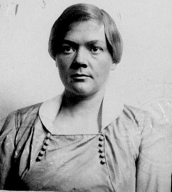
Constance Cunningham, 1917
Massachusetts-born Constance Cunningham (1886–1962) served as a YMCA canteen worker in France (from September 1917 to March 1918) and in Luxembourg (from March to June 1919). She was one of 3198 women recruited for YMCA service with the AEF in France. Her father, Frederic Cunningham, was an attorney specializing in marine law and a cofounder of the Boston Legal Aid Society; her uncle was William Lawrence, bishop of the Episcopal Diocese of Massachusetts. Before her war service, she lived in France and England for four years. In The Overseas War Record of the Winsor School, 1914–1919, she recounted some of her experiences in France:
Mr. K., our divisional secretary . . . gathered the four Y secretaries and the three Y canteen workers into a Ford camionette and whirled us away into the dripping black night (no street lights and shuttered windows on account of air raids) and deposited us on the railroad quai. Then with bated breath and dramatic gesture he told us that our troops, the first American artillery, were to entrain here, beginning at noon the next day and continuing on a six hour schedule, a battery at a time, and were to leave for the front. Our job was to build a little shelter, set up stoves to dispense hot coffee and make sandwiches to serve to the departing troops. All preparations must be finished by noon the next day, when the first battery was to arrive.
It seemed impossible to accomplish so much, but somehow we did, and two clothes-baskets full of Loganberry jam sandwiches, besides two enormous cheeses, about 80 pounds each, and a great heap of bread loaves were waiting for the men under our shelters when they arrived on the quai. May I never see Loganberry jam again! . . . .Each shift was made up of a man, who made the coffee and kept enough wood chopped to feed the stoves . . . and a girl to hand out sandwiches and cut cheese and bread under shelter. Each shift spent eight hours on the quai, then went to the sandwich making for eight hours and then got eight hours’ much needed rest. . . .
All the horses must be gotten into the box cars and the guns and equipment lashed firmly onto the flat cars, in just a certain way and under the supervision of an excited and gesticulating French railway official. This was no easy job, with only the light of an occasional lantern—for of course the Bosch knew all about the troop movement and pulled off an air raid, or rather tried to. The “contre bombardement” from all the forts surrounding . . . was so tremendous (as we well knew by the falling shrapnel) that the Gothas turned tail before they reached us. . . . .
Finally all the men had filled up on hot coffee and their canteens too, and had each as many sandwiches and as much cheese as they could afford, and then the whistles and the men “fell in.” . . . . All the stragglers were gotten aboard and the officers had squeezed into their day coaches with broken windows. . . . The French officer blew his whistle and the long train pulled slowly out. We stood on the edge of the quai and shook all the outstretched hands that were thrust through the open side doors, towards us. Finally, the last car had passed and there was only inky blackness until we turned to our little shelter where the three lanterns burned. All we could do was to return to our bread and cheese cutting and wait for the next battery. (37–39)
In June 1926, Cunningham married Vladimir Alexander Pertzoff, a Russian emigre and teaching fellow in physiology at Harvard Medical School (his brother was architect Constantin Pertzoff). She died in 1962 and is buried in Christ Episcopal Church Cemetery in Keene, VA. Her great-niece is actress Jennifer Coolidge.